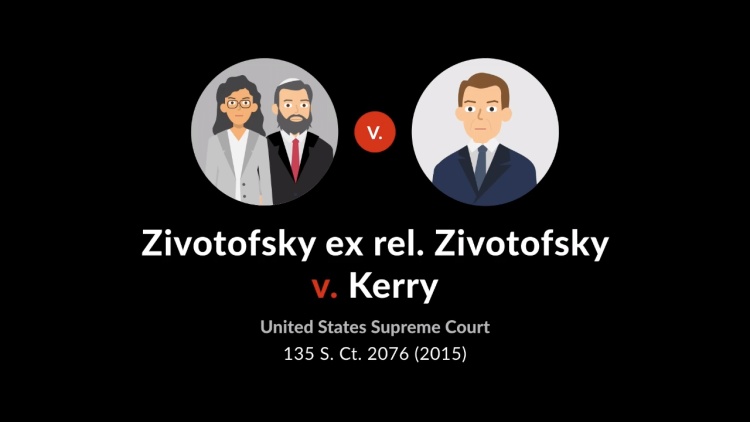Zivotofsky ex rel. Zivotofsky v. Kerry (Zivotofsky II)
United States Supreme Court
576 U.S. 1 (2015)
- Written by Craig Conway, LLM
Facts
Menachem Binyamin Zivotofsky (plaintiff) was born to United States citizens living in Jerusalem. Zivotofsky’s mother requested a passport and report of birth abroad for her son, listing his place of birth as Jerusalem, Israel. The request was denied pursuant to a State Department policy put forth by the US president, which provided that a passport could list only Jerusalem as the place of birth. Zivotofsky filed suit in federal district court against Secretary of State John Kerry (defendant), claiming that § 214(d) of the Foreign Relations Authorization Act, Fiscal Year 2003, 116 Stat. 1350, permitted citizens born in Jerusalem to list their place of birth as Israel. The district court dismissed the action, reasoning that the action presented a nonjusticiable political question and that Zivotofsky lacked standing. Zivotofsky appealed. The court of appeals affirmed the political-question determination but reversed on the standing issue. The United States Supreme Court granted certiorari to review, vacated the judgment, and remanded the matter to the court of appeals to determine whether Zivotofsky’s interpretation of § 214(d) was correct and whether the statute was constitutional, rather than whether Jerusalem was in fact part of Israel. On remand, the court of appeals held that the statute was unconstitutional, concluding that the president exclusively held the power to recognize a foreign sovereign and that § 214(d) directly contradicted this constitutional authority. The Court again granted certiorari.
Rule of Law
Issue
Holding and Reasoning (Kennedy, J.)
Dissent (Scalia, J.)
Dissent (Roberts, C.J.)
What to do next…
Here's why 904,000 law students have relied on our case briefs:
- Written by law professors and practitioners, not other law students. 47,100 briefs, keyed to 995 casebooks. Top-notch customer support.
- The right amount of information, includes the facts, issues, rule of law, holding and reasoning, and any concurrences and dissents.
- Access in your classes, works on your mobile and tablet. Massive library of related video lessons and high quality multiple-choice questions.
- Easy to use, uniform format for every case brief. Written in plain English, not in legalese. Our briefs summarize and simplify; they don’t just repeat the court’s language.






